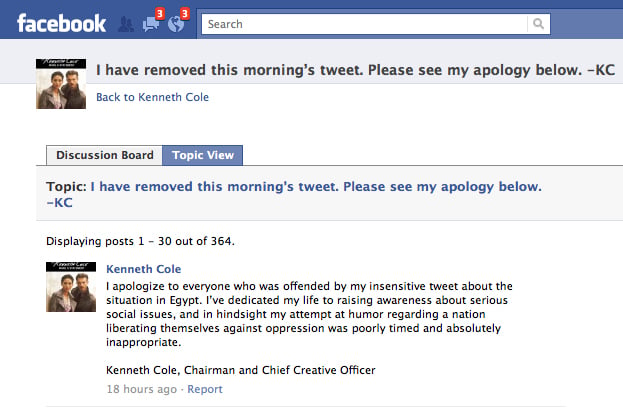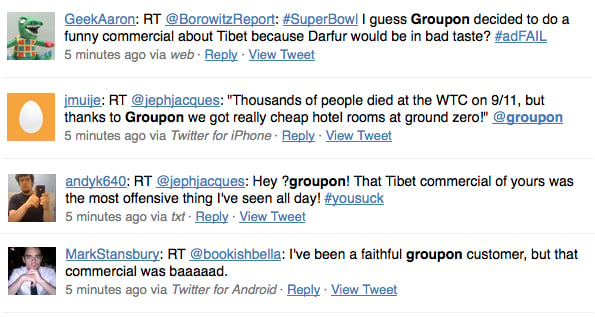 When startups and corporations do good in the world, everyone loves them. But when their campaigns offend, watch out for the mobs.
When startups and corporations do good in the world, everyone loves them. But when their campaigns offend, watch out for the mobs.
Two recent viral campaign failures demonstrate the dangers of appearing callous to your target audiences and how quickly things can spin out of control if you don’t listen and respond quickly.
First up Kenneth Cole - As the protests in Egypt were escalating, and #Egypt and #Cairo began trending on Twitter, Kenneth Cole tweeted:
“Millions are in uproar in #Cairo. Rumor is they heard our new spring collection is now available online at http://bit.ly/KCairo-KC.”
The humor in Cole’s tweet was lost on many people, and he was quickly blasted for being insensitive and tasteless. At this historical moment Cole’s joke about the protests to promote his clothing line turned out to be a costly one publicity wise, though as Christopher Penn points out - the Kenneth Cole stock did just fine – which is what really matters at the end of the day.
To Cole's credit, the company didn’t bury their head in the sand; they deleted the offending tweet and apologized on Twitter and on Facebook.

Then the social media world moved on until Sunday’s Super Bowl ads.
Next in the line of fire – Groupon. Like any company or nonprofit investing $3M in a 30 second TV spot, Groupon wanted to make a splash. They worked with an agency to develop a series of ads that jived with the company’s sense of humor, their passion for raising awareness about Tibet and the Brazilian Rainforest coupled with discounts of Tibetan food in Chicago and Brazilian bikini waxes in NYC. The tasteless ads bombed and the social media mob formed again. Comments flooded in –
“I guess Groupon decided to do a funny commercial about Tibet because Darfur would be in bad taste? #adfail”
 Others like Katie Paine, nicknamed the “The Queen Of Measurement” and a well respected strategist for corporations and nonprofits sent out a link to cancel Groupon accounts.
Others like Katie Paine, nicknamed the “The Queen Of Measurement” and a well respected strategist for corporations and nonprofits sent out a link to cancel Groupon accounts.
How did Groupon score in its response to this moment of reputation crisis? With a single tweet linking to a donate page to the Tibet Fund. #ThatIsAll. Comments flooded their blog, but were moderated. Some blog comments were finally made public today around 11 AM EST. At 1PM EST, they tweeted a bit but skirted around the ads. There was no apology. Is burying your head in the sand a good strategy when your campaign flops and insults people?
Good Past Track Records
The interesting thing is that both Kenneth Cole and Groupon have strong records using their brands to highlight important social justice issues. Kenneth Cole is considered the first in the fashion industry to publicly support AIDS awareness and research. Andrew Mason, founder of Groupon holds Groupon challenges to raise money for several charities including the Tibet Fund, Rainforest Action Network, and Greenpeace. Prior to Groupon, Mason founded "ThePoint" to raise money for charities. Are good intentions enough, however, when multi-million dollar companies develop “edgy” campaigns that poke fun at the political unrest in Tibet and Cairo to promote their brand? The social media world says no and its outrage has quickly spawned a social media mob publically crucifying both companies.
“How brands handle crises like this matters,” said Shelly Kramer of V3 Integrated Marketing. “It’s the public’s reaction to things like this that is important to pay attention to, especially to those of us who study social media, who help brands manage their social media accounts, and who work with brands to put systems in place to handle crises situations – both before and after they happen.”
Are the Viral Wars Leading to Bad Judgment?
At Frogloop, we talk about the importance of nonprofits leveraging the news cycle to fundraise, launch action alerts, blog, tweet, etc. Has the battle for pageviews, tweets, FB shares, comments, word of mouth marketing gotten so crazy competitive, that agencies judgements have become clouded? Are they out of touch with consumers?
"To me, there's no such thing as all publicity being good publicity. In Groupon and Kenneth Cole's case, trying to profit from the suffering of others is never smart, no matter how good the intent behind it may have been (in Groupon's charitable support, for example). There's a fine line between humorous and humorless and I think these two companies missed it,” said Danny Brown who runs 12Kfor12K and Bonsai Interactive.
Measuring Viral Campaigns
Even though both of these campaigns were successful in terms of traffic and generated much discussion on social media channels, Paine says the real question that needs to be answered is how many customers did they loose? “This is the problem with measuring results in terms of AVE (Advertising Value Equivalents). What’s the value of a ‘trending topic’ vs a customer or a [supporter],” said Paine on Twitter.
Lessons Learned
- Test your campaigns. Don’t work in a bubble. Just because you think something is funny or great, doesn’t mean your target audiences will agree.
- It’s ok to be edgy and push the envelope but use good judgment.
- Speak up (quickly) when you mess up. It’s ok to admit you were wrong.
- ROI should not just be measured in traffic, number of tweets, and FB shares. Analyzing the impact your campaign had on your target audience and current members is critical. Did it resonate? Did they hate it?
More Resources:
Bitter Irony: Epic Change - Stacey Monk
Groupon Super Bowl Ad: When Being Clever Offends and How to Win One for Tibet - Liz Strauss



COMMENTS